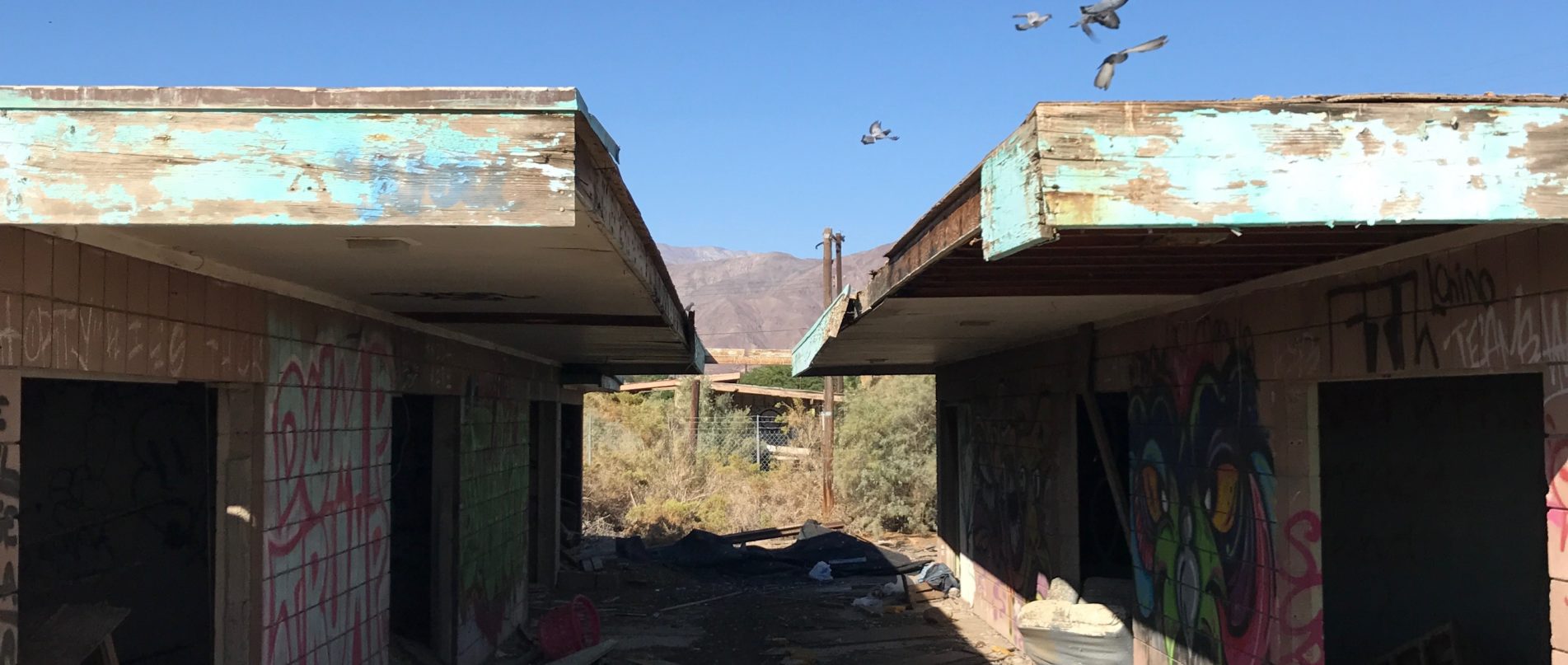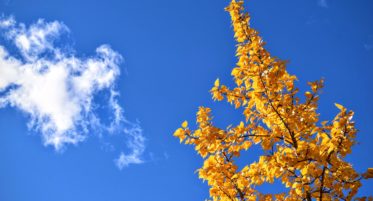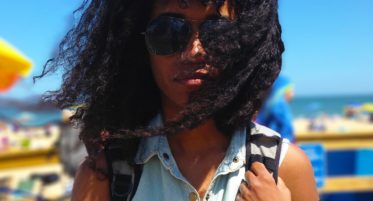
Prompt Images
11:08 A.M.
There he is, picture perfect, 108 degrees in the late morning light, 100 feet below sea level, sitting in a lawn chair, dust devil in the yard over his shoulder, an AR-15 casually in his lap, his face low on my horizon, unknowable, fractured into anonymity by distance and the slightly cracked glass of my windshield.
Slab City, California. The last free place. A place I regret coming.
He is shouting, but the rifle does not move, resting on his thighs, its presence more like a security blanket than a promise of violence, the Chocolate Mountains rising in the air at the edge of the valley, framing the security fence that in turn frames his RV, a single rainbow windsock attached to the edge of a plywood sign that reads KEEP OUT.
I know why he is angry. My car, one of many. Circling like carrion birds.
I slow as I pass, raising two fingers off the steering wheel, a farmer’s wave, car in first gear and my face in neutral. The lower half of his mouth visible from beneath the flop of his boonie hat, opening and closing on the line of shadow cutting his lips in two, spitting tobacco on the ground, chewing on the light.
“Fuck,” I hear. The only word I make out as I pass. But fuck about sums it up.
THEN
I used to fancy myself a photographer.
My father gave me his old Olympus when I was 15, and I carried it everywhere. I shot on film, black and white, developing it in the darkroom at school, losing myself in the pitch black and chemical smells, skipping classes to be there, the skin on the tips of my fingers gently peeling from exposure to fixer, the purpleorange of the safelight illuminating certain dreams.
I took pictures of friends, mostly, but also the by-rote subject matter of teens who either pretended to or actually liked Radiohead and fancied themselves trapped in the pruned and supposed soulless nothings of Middle America. Weathered barns, suburban decay, grain silos, abandoned factories, shadows on stairs, dead rats in the alleys of our modest downtown, and train tracks, the ever-present metaphor of youth. Tracks that lead to places with big names and bigger dreams, Chicago and Denver and New York, places we felt in our bones, places we were sure somehow knew we existed, needing us as much as we needed them, mutually assured completion.
I made full frame prints, the edges of the film visible like tiny bars of a cage, each picture an animal, a physical being summoned from the air and then trapped. It was time travel, a simultaneous jumbling and unjumbling of narrative, the vectored strands of backwhen and rightnow squared together in a knot and smashed flat on matte paper, four dimensions turned two. Particles and waves made solid, something you could keep or give away, slipping it into the grate of a boy’s locker, unsigned, feeling the spike of loss, a small forever gone forever.
A few still exist, pressed together back to back in manila folders, sticky with the duct tape I used to fix them to the cinder blocks of my dorm room, now stored in reusable shopping bags and locked in a low, red, metal cabinet.
Some of them are even beautiful, I suppose. I certainly think so, but it’s hard to know.
6:33 A.M.
Phone in hand, 10 minutes to spare, flat rock cool against the back of my thighs, the sky young and lavender, thousands of feet above the Mojave Desert, thin clouds of mist rising from the yuccas on the plain, my eyes watering in the cool air, happy to be here, to be waiting.
Ryan Mountain, California. Facing east. A place I do not regret coming.
Sounds on the path to my left, the crunching of feet on rocks and sand, the settled rhythm of two people who have done this before and will do it again, perhaps the hint of hurry and frustration, given the time and the almost dawn. Strands of yellow light peaking through the serrated rise of the eastward mountains, like streamers in a high school auditorium, twisted and inexact. I hear the change in their steps as they see me, but do not turn, their low, hurried whispers mixing with the scrape of their boots, the click and shuffle of disappointment and changing plans.
I know why they are angry. My body, one too many. Perching like a carrion bird.
I shift as they come closer, no longer whispering, raising my thighs off the rock and pulling my knees to my chest, a posture of both guilt and strength. My phone is still in my hand, and I flip on the camera, hoping the light from my screen will not draw their attention, suddenly embarrassed by what I came here to do, of wanting to simultaneously have and to capture a moment. The sun arrives, huge and humbling, and my phone stays at my side.
“Wow,” I hear. Still not looking. But wow about sums it up.
THEN
I used to fancy myself a writer.
My mother gave me “The Hobbit” when I was 8, and I read it everywhere. I read in the middle seat of our van, on a bench at the KOA campground, in the living room of my grandma’s apartment, losing myself in a world outside my world, ignoring everyone around me, the skin on the tips of my fingers electric against each page, the shadows of Mirkwood haunting certain dreams.
I wrote stories for myself, at first, but also for my friends, page long adventure tales about werewolves and Teenage Mutant Ninja Turtles I sold for milk money in the lunchroom at Wanamaker Elementary. I read as I grew and I wrote, tearing through the Book-It list, finishing stories I didn’t always understand, but still lodged themselves in my chest. Books that were written by authors with big names and bigger reputations, Hemingway and Dostoyevsky and Vonnegut, stories I felt in my bones, books I was sure somehow knew I existed, needing me as much as I needed them, mutually assured completion.
I wrote longer stories, essays, the edges of my high school legal pads curling from the friction of my trailing palm, each piece an animal, a physical being summoned from the air and then trapped. It was godly, simultaneously jumbling and unjumbling a narrative, the vectored strands of story mating with each other and birthing children, smashed flat on yellow paper, an entire world wrapped in a notebook. Future and past made solid, something you could keep or give away, slipping it into the space under a teacher’s door, a small forever that might be published forever.
A few of these stories still exist, pressed together inside a silver folio I stole from my father’s desk, thick with annotations on Post-It notes, hidden in a reusable shopping bag and locked in a low, red, metal cabinet.
Some of them are even beautiful, I suppose. I certainly think so, but it’s hard to know.
1:10 P.M.
There I am, tripping on the threshold plate, the noondark of the Ski Inn bar a wall against the encroaching sun, eight regulars turning to look with one neck, their mottled faces blank, unknowable, clustered at the L-shaped corner, waiting for me to move, to step inside or go.
Bombay Beach, California. The shores of the Salton Sea. A place I may regret coming.
Nobody speaks as I sit, the crunching of fingers against peanut shells, the steady plink of pinball in repose, the wet smack of lips on glass, settled sounds of people who have sat in quiet before, of people long forced to wait. There are thousands of bills stapled to the bar walls, the ceiling, muffling the sounds, each one with a name or a note, small claims on time and space, relics from an era that will never come back.
I know why they are angry. My body, one too few. Landing only to eat like a carrion bird.
I smile at the bartender, raising two fingers in greeting, a drinker’s summons, intentions in pocket. I slide her two 20s, drawing a circle on the lacquered wood with my pointer. She nods, then pours everyone in the bar a round. The regulars turn, nodding thanks with one neck, and we continue to sit without speaking. The woman closest to my right pulls a granola bar out of her purse and slides it to me like a drink in a Western. The door rips open and our dark, soft world is blasted with light and sound, four 20-somethings in new but ripped jeans, hovering on the threshold, laughing, taking pictures.
“Christ,” I hear. The word almost lost against the carpet of bills. But Christ about sums it up.
THEN
I used to fancy myself a loner.
My parents bought me a Volvo when I was 16, and I drove it everywhere. Shit brown, crank-sunroof, a sharkbite missing from the passenger headrest, losing myself in the cornfields and the sorghum, skipping classes to drive along the river, the skin on the tips of my fingers drawing dust lines on the dashboard, the redorange of the speedometer illuminating certain dreams.
I drove some places with friends, but mostly drove alone, by-rote destinations of a teen who either pretended to or actually liked Radiohead and fancied himself trapped by the support and expectations of his parents. Abandoned factories, grain silos, places with dead rats, suburban decay, shadows on stairs, and train tracks, the ever-present metaphor of youth. Tracks that rippled under the tires as I crossed, feet off the floormats, superstition I felt in my bones, a ritual I was sure somehow knew I performed it, needing me as much as I needed it, mutually assured existence.
On Sundays after soccer, I would fill up the tank and choose a direction, driving as far I could before sunset, each journey a hunt, a physical being summoned from the air and then chased. It was time travel, a trip somewhere unknown without the promise of enough daylight to get there, the vectored strands of mixtapes and sunbeams merged into a yellow line and smashed flat in the center of the highway, everything I was and could be, possible and present. A world that only I owned, truths I could keep or give away, slipping them through the crack of the sunroof, feeling the spike of loss, a small forever only I would remember.
The memories still exist, pressed together in the ropey folds of my frontal lobe, some expanded, some dessicated, the natural fantasticism of nostalgia twisting truths into myth and filling in the blackened and concussed gaps with kindly lies, memories now more real than they are true.
Some of them are even beautiful, I suppose. I certainly think so, but it’s hard to know.
4:35 P.M.
Phone in hand, calves falling asleep, elbows on knees and thighs stuck to the warming plastic of the toilet seat, third stall of four in a truck stop bathroom, scrolling through the pictures I took earlier, debating about posting on them online, furious with myself.
I know why I am angry. My body, one too childish. Perched like a carrion bird.
I wish I could tell you I am a different person from who I am. That I have outgrown my fancies, my manufactured loneliness. That I don’t travel by myself, phone in hand, driven at least partially by the intent to take pictures and write about it when I’m done. That I don’t take these trips alone so no one else can own my truth. That I don’t relish the power of controlling the narrative. That my nostalgia is less than instant, fabricated, a conceit I choose to pass off as art, slipping it into stories and photos, signing my name, as if my forevers deserve to live forever, posted in square frames and clumsy paragraphs, for all the world to see.
The gun in his lap. The sun over the desert. The dark of the bar. Things I saw. Things that my phone can only partially prove. Which leaves this story you can choose to trust.
“Bullshit,” I say. Hissed in anger or maybe not. But bullshit about sums it up.



